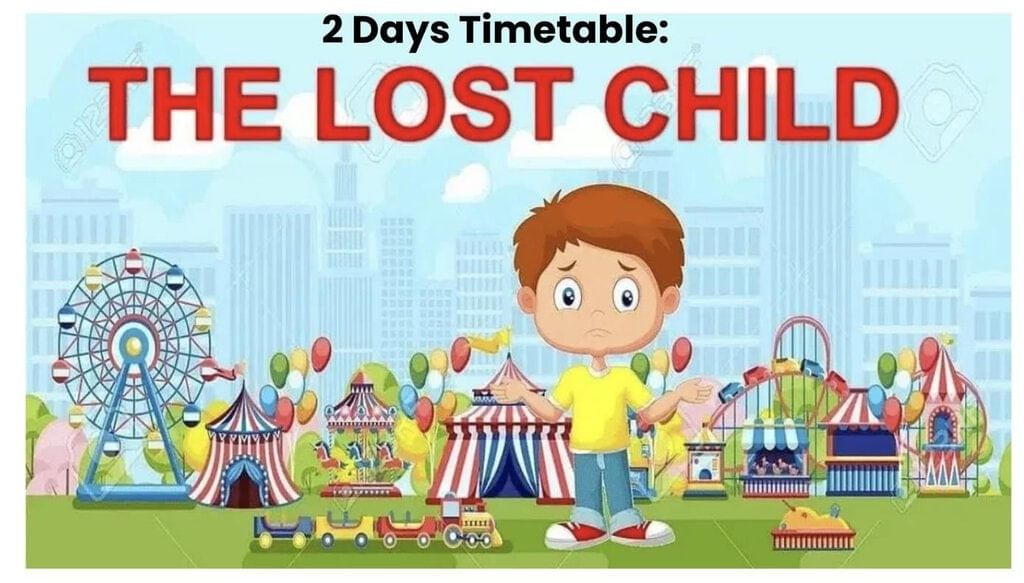2 Days Timetable: The Lost Child | English Class 9 PDF Download
The chapter "The Lost Child" is an essential part of your Class 9 English curriculum and plays a significant role in your exams. It is a story that explores themes of childhood, desire, and realisation. To ace this chapter and your exams, it's crucial to plan your study effectively. By the end of this document, you will have a clear understanding of how to do just that.

Day 1: Understanding the Chapter
What to Cover:
- Read the Chapter: Start by reading the chapter "The Lost Child". Understanding the story's plot, characters, and central theme is essential.
- NCERT Solutions: Go through the NCERT Solutions for "The Lost Child" to gain a deeper understanding of the chapter.
Study Tips:
- Take Notes: While reading, make concise notes of key events, characters, and important quotes.
- EduRev Tip: Use the NCERT Textbook for "The Lost Child" available on EduRev for reference.
Day 2: In-Depth Analysis and Practice
What to Cover:
- Character Sketches: Familiarise yourself with the characters and their roles in the story. Understand their motivations and actions.
- Summary: Read the Summary of the chapter to reinforce your comprehension.
- Long Questions & Answers: Solve Long Questions & Answers for "The Lost Child" to prepare for extended responses.
Study Tips:
- Practice Questions: Solve Practice Questions for "The Lost Child" to test your knowledge.
- EduRev Tip: EduRev provides a wealth of resources, including character sketches, summaries, and practice questions, making it a valuable tool for comprehensive study.
Revision and Testing Your Knowledge
What to Cover:
- Revision: Go through your notes, character sketches, and the chapter summary.
- Topic-Wise Tests: Take Topic-Wise Tests for "The Lost Child" to assess your understanding.
- Use quick revision sources: Revise the chapter quickly with the help of a fun PPT. Improve your understanding of the chapter with Mind Map: The Lost Child and test your knowledge with Flashcards.
Study Tips:
- Test Yourself: Regularly assess your knowledge by solving different types of questions, including long and short answers, very short answers, and extract-based questions.
- EduRev Tip: EduRev offers a variety of question types and tests, ensuring you are well-prepared for any exam format.
Remember to stick to this study plan and make the most of the EduRev resources to excel in your Class 9 English exams.
Class 9 Exam | English Class 9 | Chapter: The Lost Child
Here are all the links mentioned in the study plan, divided under suitable headers:
Introduction:
Day 1: Understanding the Chapter:
Day 2: In-Depth Analysis and Practice:
- NCERT Solutions for "The Lost Child"
- Character Sketches
- Summary: The Lost Child
- Practice Questions: The Lost Child
Revision and Testing Your Knowledge:
- Topic-Wise Tests: The Lost Child
- Long Questions & Answers: The Lost Child
- Short Questions & Answers: The Lost Child
- Very Short Questions & Answers: The Lost Child
- Mind Map: The Lost Child
- Flashcards: The Lost Child
- PPT: The Lost Child
Ensure you utilise these resources effectively to enhance your understanding and preparation for the chapter "The Lost Child" in Class 9 English.
Happy studying!
|
180 videos|976 docs|124 tests
|
FAQs on 2 Days Timetable: The Lost Child - English Class 9
| 1. What is the central theme of "The Lost Child"? |  |
| 2. How does the author use imagery to convey emotions in "The Lost Child"? |  |
| 3. What moral lessons can be drawn from "The Lost Child"? |  |
| 4. How does the setting influence the plot of "The Lost Child"? |  |
| 5. What is the significance of the child's longing for material objects in the story? |  |

















